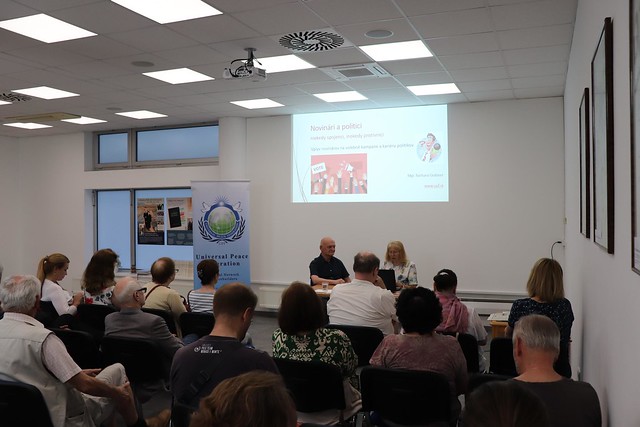Bratislava, Slovakia—The complicated relationship between politics and the media was the topic of a lecture held by UPF and its International Media Association for Peace (IMAP).
The topic for the lecture held on June 19, 2023, “Journalists and Politicians,” was chosen because of the Slovakian elections that will be held in September and because the election campaign is expected to become heated during the summer.
The lecturer, Barbara Grabner, who has worked as a journalist for over 30 years, said: “Ethical journalism demands that journalists must not go after an ideological enemy or refuse to report a balanced report, pro and con.
“The reality is different—unfair reporting is common. For example, the media use labeling as a method of discrediting.” When a politician or expert is labeled “conservative” or “right-wing,” she said, it tells the public: Watch out!
Freedom of the press is a pillar of democratic society, but the mere existence of many newspapers or TV channels does not guarantee diversity of opinion.
“The great consensus of media content today is not due to censorship, as in totalitarian states,” Mrs. Grabner said, “but to the use of the same sources. In the past there were many party newspapers, and readers naturally expected a distinctly partisan orientation to the content. Today we get a stew.”
Nevertheless, there is hidden partisanship, she said: Research shows that two out of three journalists prefer left-wing or liberal views, politicians or sources.
Journalists not only inform and educate the public on political issues but also act as watchdogs: They might force the government to stop activities that harm society—for example, by investigating and reporting on the harmful practices of a company or an authority.
In the 1970s, journalists increasingly resorted to campaigning instead of mere reporting. "Journalists nowadays often are like attack dogs, primarily hunting conservative politicians, or play the role of extra-parliamentary opposition. But who controls the controller? What qualifications and virtues must journalists have when they have such power?" she asked.
Mrs. Grabner showed a copy of The Washington Times, a daily newspaper established in 1982 by the UPF founders. She quoted Bernard Goldberg, a former news presenter on the U.S. television network CBS, who referred to The Washington Times on 10 occasions as an example of fair and balanced reporting. The audience also learned about our founders’ investment in media in several nations and the guiding principles of the International Media Association for Peace.
At the end, Mrs. Grabner left the audience with this advice: “Learn about the philosophy of a journalist, editor or publisher! Get information from different sources; read more educational magazines and factual books!"
An attending journalist from a private radio channel became so inspired that he said he will produce a radio interview and podcast based on the lecture.
The 35 guests appreciated the pleasant coolness of the Peace Embassy, in contrast to the heat on the street. As they enjoyed refreshments, they took part in a lively discussion that concluded the event.

